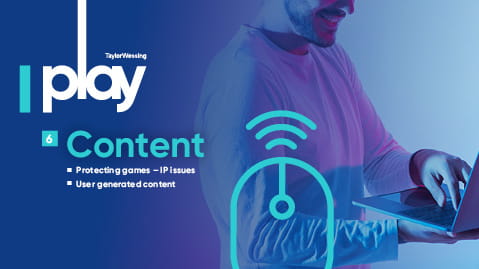- Home
- News & Insights
- Insights
- $name

12. August 2021
Play: our guide to the video games industry – 4 von 4 Insights
Play: Intellectual property
- Quick read
Why are IPRs important?
The value of a game is usually in its intellectual property rights (IPRs), and protection is critical to maximising commercial reward and preventing others from trading off your creative product, brand reputation, and technological innovations. Having the correct IPR protection adds significant value in a potential sale and opens up potentially lucrative revenue streams through licensing to third parties.
On the flip side, care is needed to ensure that you have the right permissions to use IPRs that you do not own to avoid inadvertently infringing someone else's rights. This could result in your having to withdraw or significantly rewrite games and pay monetary compensation to the IPR owner, as well as damage to your reputation.
Developing a proactive and agile IPR strategy to protect and secure appropriate rights is essential to enable the successful development, financing, and distribution of games.
This article explains the core IPRs that protect games, who owns them, and additional considerations raised by user-generated content. For more information on this topic, including how to enforce your IPRs against third party infringers, the line between permitted inspiration and infringement, and steps to ensure you do not infringe yourself, download the full Play guide here.
Protecting games
Games comprise several elements which are protectable by international IPRs. The same elements of a game could be protected by multiple IPRs. The main types of IPR that protect games in the UK are:
- Copyright – Copyright-protected elements most likely to exist in games include graphics, artwork, detailed narratives, text, audio and software code. The work must be original to be protected, meaning it was created using skill, judgement, effort, and individual creativity. Copyright protection lasts for a long time – in the UK, the copyright-protected elements most likely to exist in games are protected from creation until 70 years after the creator's death.
- Registered trade marks – Company names, trading names product/service names, brand names, logos, audio, and even some shapes, motions, and colours, among other things, can be protected by registering them as trade marks. As well as the name of the video game and any logo, thought should be given as to whether character names, level names, images of characters and the like should be registered. Registered trade marks can provide indefinite protection if they are used and renewed.
- Passing off – The UK's passing off law protects the goodwill generated by using company names, trading names, product/service names, brand names, logos, and "get up" (meaning the general look of products and their packaging). Enforcing rights under a passing off action is usually more expensive and less straightforward than enforcing rights under a registered trade mark. That is why obtaining registered protection for key trade marks can be crucial.
- Designs – Design rights can be used to protect components such as the look of a game itself, including potentially individual frames of gameplay, and the appearance and shape of games consoles, controllers and other accessories. The criteria for these features to qualify for protection, and the scope of protection, differ between registered or unregistered design rights, with registered rights generally providing a greater scope of protection.
- Patents – Patents are registered IPRs protecting inventions that are technical products or processes. In the UK, patents are granted for new and inventive inventions compared to technology that has gone before (known as prior art) that are capable of industrial application. There are various categories of subject matter that cannot be protected by patents in the UK, including computer programs, presentations of information, mathematical methods, algorithms "as such", and rules and methods for performing mental acts, playing games or doing business. However, inventions which are implemented by running computer software on a conventional hardware system to produce an added "technical effect" – which may be present in games – are potentially protectable by patents.
- Confidential information – Though not an IPR as such, confidential information can be protected against unauthorised use and disclosure through an action for breach of confidence. This cannot be used in relation to any public information or visible element of a published game but there may be confidential information in software code, the game engine, and in details of games pre-publication.
Who owns IPRs?
In most cases in the UK, when employees develop IPRs during their employment, the employer will automatically own the IPRs. When outside consultants or contractors develop IPRs, a signed, written contract is needed to transfer ownership to the business. If IPRs are developed before a company is set up or by a third-party studio, the developer may hold ownership.
It is best practice to enter into signed contracts with employees, consultants, and any necessary third parties at an early stage. Those contracts should expressly set out who owns any IPRs already in existence and state that any IPRs created in the future are automatically assigned to the business.
Crucially, external developers will own the IPRs in games unless they assign them formally to publishers.
User-generated content
Additional IPR considerations apply when games feature user-generated content. The ownership of user-generated content should be provided for in user terms and conditions. Publishers that make user-generated content available online may be responsible for users' infringement of third party IPRs if they are aware of the infringement (eg through a notification from the relevant third party), and do not take the infringing content down.
Find out more
These are just some of the considerations around intellectual property rights; find out more in our Play guide.
In dieser Serie
Play: the 4th edition of our guide to the video games industry
Download the guide
22. Juni 2021
von mehreren Autoren
Play: Small print and data
27. Juli 2021
von Debbie Heywood
Play: Intellectual property
12. August 2021
von Xuyang Zhu

